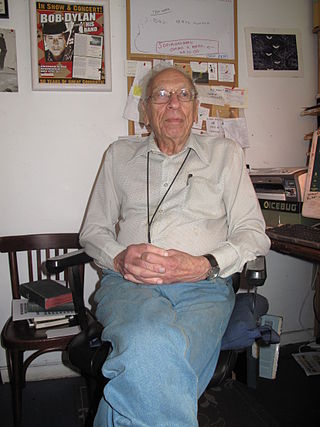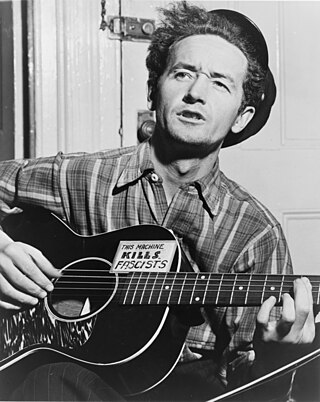Related Research Articles

Peter Seeger was an American folk singer and social activist. A fixture on nationwide radio in the 1940s, Seeger also had a string of hit records during the early 1950s as a member of the Weavers, notably their recording of Lead Belly's "Goodnight, Irene", which topped the charts for 13 weeks in 1950. Members of the Weavers were blacklisted during the McCarthy Era. In the 1960s, Seeger re-emerged on the public scene as a prominent singer of protest music in support of international disarmament, civil rights, counterculture, workers' rights, and environmental causes.

Judith Marjorie Collins is an American singer-songwriter and musician with a career spanning seven decades. An Academy Award-nominated documentary director and a Grammy Award-winning recording artist, she is known for her eclectic tastes in the material she records, for her social activism, and for the clarity of her voice. Her discography consists of 36 studio albums, nine live albums, numerous compilation albums, four holiday albums, and 21 singles.
John Cohen was an American musician, photographer and film maker who performed and documented the traditional music of the rural South and played a major role in the American folk music revival. In the 1950s and 60s, Cohen was a founding member of the New Lost City Ramblers, a New York-based string band. Cohen made several expeditions to Peru to film and record the traditional culture of the Q'ero, an indigenous people. Cohen was also a professor of visual arts at SUNY Purchase College for 25 years.

Elizabeth "Libba" Cotten was an American folk and blues musician. She was a self-taught left-handed guitarist who played a guitar strung for a right-handed player, but played it upside down. This position meant that she would play the bass lines with her fingers and the melody with her thumb. Her signature alternating bass style has become known as "Cotten picking". NPR stated "her influence has reverberated through the generations, permeating every genre of music."
Bonnie Dobson is a Canadian folk music songwriter, singer, and guitarist, most known in the 1960s for composing the songs "I'm Your Woman" and "Morning Dew". The latter, augmented by Tim Rose, became a melancholy folk rock standard, covered by Skating Polly, Fred Neil, Ralph McTell, Lulu, Nazareth, the Grateful Dead, the Jeff Beck Group, Robert Plant, the Pozo-Seco Singers, The 31st of February, Long John Baldry, DEVO and Einstürzende Neubauten, among many others.

The Gaslight Cafe was a coffeehouse in the Greenwich Village neighborhood of Manhattan, New York. Also known as The Village Gaslight, it opened in 1958 and became notable as a venue for folk music and other musical acts. It closed in 1971.
Alan Mills was a Canadian folksinger, writer, and actor. He was best known for popularizing Canadian folk music, and for his original song, I Know an Old Lady Who Swallowed a Fly. He appeared on several radio and television programs and in movies.
"There Was an Old Lady Who Swallowed a Fly" is a children's rhyme and nonsense song of a kind known as cumulative.

Israel Goodman Young, known as Izzy Young, was a noted figure in the world of folk music, both in America and Sweden. He was once the owner of the Folklore Center in Greenwich Village, New York, and from 1973 until his death, owned and operated the Folklore Centrum store in Stockholm.

The American folk music revival began during the 1940s and peaked in popularity in the mid-1960s. Its roots went earlier, and performers like Josh White, Burl Ives, Woody Guthrie, Lead Belly, Big Bill Broonzy, Richard Dyer-Bennet, Oscar Brand, Jean Ritchie, John Jacob Niles, Susan Reed, Paul Robeson, Bessie Smith, Ma Rainey and Cisco Houston had enjoyed a limited general popularity in the 1930s and 1940s. The revival brought forward styles of American folk music that had in earlier times contributed to the development of country and western, blues, jazz, and rock and roll music.
Gerdes Folk City, sometimes spelled Gerde's Folk City, was a music venue in the West Village, part of Greenwich Village, Manhattan, in New York City. Initially opened by owner Mike Porco as a restaurant called Gerdes, it eventually began to present occasional incidental music. It was first located at 11 West 4th Street, before moving in 1970 to 130 West 3rd Street. The club closed in 1987.

Contemporary folk music refers to a wide variety of genres that emerged in the mid 20th century and afterwards which were associated with traditional folk music. Starting in the mid-20th century a new form of popular folk music evolved from traditional folk music. This process and period is called the (second) folk revival and reached a zenith in the 1960s. The most common name for this new form of music is also "folk music", but is often called "contemporary folk music" or "folk revival music" to make the distinction. The transition was somewhat centered in the US and is also called the American folk music revival. Fusion genres such as folk rock and others also evolved within this phenomenon. While contemporary folk music is a genre generally distinct from traditional folk music, it often shares the same English name, performers and venues as traditional folk music; even individual songs may be a blend of the two.
Upon his return to New York in 1959 after a nearly a decade spent based in London, UK, Alan Lomax produced a concert, Folksong '59, in New York City's Carnegie Hall, featuring Arkansas singer Jimmy Driftwood; the Selah Jubilee Singers and Drexel Singers ; Muddy Waters and Memphis Slim (blues); Earl Taylor and the Stoney Mountain Boys (bluegrass); Pete Seeger, Mike Seeger ; and The Cadillacs.
Swallow Hill Music is a Denver, Colorado based non-profit organization dedicated to promoting and preserving roots, acoustic and folk music. The school is inspired by the Old Town School of Folk Music in Chicago. Swallow Hill hosts hundreds of concerts a year ranging from national acts, such as Sheryl Crow and Josh Ritter, to many talented local artists and former students.
New York State is a major center for all types of music. Its diverse community has contributed to introducing and spreading many genres of music, including salsa, jazz, folk, rock and roll, and classical. New York's plethora of music venues and event halls serve as popular markers which have housed many noteworthy artists.
Richard Weissman is an American singer, composer, banjo player, author and teacher.
The Colorado Music Hall of Fame is a museum located in the Trading Post at Red Rocks Amphitheatre.
Anton Robert "Bob" Yellin is an American banjo player and founding member of The Greenbriar Boys bluegrass music group.

Walter Bell Conley was an American folk singer, Hollywood actor, voice actor, and owner of Denver's folk venue Conley's Nostalgia. The Rocky Mountain News described Conley as the founding father of Denver's folk scene, which began in the late 1950s and stretched into the mid-1960s. Conley shared stages with, and opened for, Josh White, Cisco Houston, Mama Cass Elliot, Floyd Red Crow Westerman, and Judy Collins, among many others. Conley also opened his home to a young and unknown Bob Dylan in the summer of 1960, and introduced Denver to the little-known Smothers Brothers that same year. As the owner of Conley's Nostalgia, Walt brought in big-name performers such as John Fahey and Dave Van Ronk. To those who worked with him, knew him, and wrote about him, he is referred to as Denver's “Grandfather of Folk Music.” Conley remained an entertainer until his death from a massive stroke at the age of 74. At the time of his death, Conley was married to Joan Holden. Conley had four children from previous relationships. Conley's resting place is the Fort Logan National Cemetery in Denver, Colorado.

The Family Dog Denver was a concert dance hall located at 1601 West Evans Avenue in Denver, Colorado. Opened from September 1967 to July 1968, it is regarded as a seminal music venue that launched Denver on its trajectory to its current status as a major concert destination by introducing never-before-seen acts like The Doors, Van Morrison, Jimi Hendrix, Cream, Buffalo Springfield, Janis Joplin, Chuck Berry, and many others. Many acts, like The Doors and Van Morrison, for example, had yet to become famous when they played The Dog, evidenced by the poster artists having to stylize the names of their leading songs into the poster art for the shows. The Family Dog is also seen as a cultural turning point in Denver from the conservative, western-minded sensibility of the early and mid-20th century to the current, liberal-minded climate. The venue's history, surrounding drama and ultimate impact had been largely unknown and unrealized until it was unearthed and detailed for the first time in the 2021 documentary The Tale of the Dog, produced and directed by Dan Obarski & Scott Montgomery and distributed by Cinedigm. As there are no useful photos, no video and little written history remaining of the Family Dog Denver, the film's oral history format told in first person by the people who were there serves as a definitive reference for “The Dog.”
References
- ↑ Malkoski, P.A. (2012). The Denver folk music tradition: an unplugged history, from Harry Tufts to Swallow Hill and beyond. United States: The History Press.
- ↑ Zack, Ian (2015). Say no to the devil: The life and musical genius of Rev. Gary Davis. United States: University of Chicago Press.
- ↑ Scaduto, Anthony (16 March 1972). "Bob Dylan: An Intimate Biography, Part Two". rollingstone.com. Retrieved 19 October 2016.
- ↑ Malkoski, P.A. (2012). The Denver folk music tradition: an unplugged history, from Harry Tufts to Swallow Hill and beyond. United States: The History Press.
- ↑ Youngstrom, David (July 27, 1974). "Folk music not only lives in Colorado, it thrives". Billboard. p. 33.
- ↑ Moody, Greg (15 February 2012). "Colorado Music Hall Of Fame Inducts Harry Tuft & Barry Fey". denver.cbslocal.com/. Retrieved 19 October 2016.
- ↑ Solomon, Jon. "Harry Tuft on being inducted into the Colorado Music Hall of Fame". westword.com. Retrieved 19 October 2016.
- ↑ "A proclamation honoring Harry Tuft, founder and long-time owner of Denver Folklore Center". denver.legistar.com. Retrieved 19 October 2016.